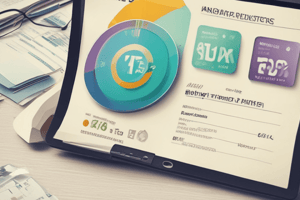Podcast
Questions and Answers
Which type of inquiry can negatively impact your credit score?
Which type of inquiry can negatively impact your credit score?
- Soft inquiry
- Hard inquiry (correct)
- Personal inquiry
- Public inquiry
Personal information like addresses does not affect creditworthiness.
Personal information like addresses does not affect creditworthiness.
True (A)
What is the most common public record that appears on credit reports?
What is the most common public record that appears on credit reports?
Bankruptcy
Chapter 7 bankruptcy records are removed after ____ years.
Chapter 7 bankruptcy records are removed after ____ years.
Match the following account statuses with their meanings:
Match the following account statuses with their meanings:
Which of the following is a common reason for disputing information on a credit report?
Which of the following is a common reason for disputing information on a credit report?
All creditors are required to report accurate account details.
All creditors are required to report accurate account details.
Which factor has the greatest impact on FICO credit scores?
Which factor has the greatest impact on FICO credit scores?
Recent credit applications have a minimal effect on credit scores.
Recent credit applications have a minimal effect on credit scores.
What is recommended to maintain a good credit score in terms of credit utilization?
What is recommended to maintain a good credit score in terms of credit utilization?
Credit scores typically range from _____ to _____ for most FICO models.
Credit scores typically range from _____ to _____ for most FICO models.
Match the following factors with their influence on VantageScore:
Match the following factors with their influence on VantageScore:
Which of the following factors is most important in determining lending approval?
Which of the following factors is most important in determining lending approval?
A lower Bankruptcy score indicates a higher risk of bankruptcy.
A lower Bankruptcy score indicates a higher risk of bankruptcy.
What should you check in the Messages section of the Credit Report?
What should you check in the Messages section of the Credit Report?
The range of a standard credit score is typically ____ to 850.
The range of a standard credit score is typically ____ to 850.
Match the following components of a Credit Report with their purpose:
Match the following components of a Credit Report with their purpose:
How can you initiate a dispute with Experian?
How can you initiate a dispute with Experian?
Authorized user trades with a negative status will impact the FICO score.
Authorized user trades with a negative status will impact the FICO score.
What information about the applicant is included in the Applicant Information section?
What information about the applicant is included in the Applicant Information section?
Credit reports should be reviewed for accuracy, fraud, and _____.
Credit reports should be reviewed for accuracy, fraud, and _____.
What is the purpose of the preliminary credit review?
What is the purpose of the preliminary credit review?
Study Notes
Personal Information
- Personal information reported to Experian can vary, including:
- Name variations shown under "Also Known As"
- Social Security number variations displayed, but the actual number is not revealed for security reasons
- Addresses associated with accounts may include work or friends' addresses without affecting creditworthiness
- Year of birth, phone numbers, and names of joint account holders or co-applicants may be reported
- Employment details provided by creditors do not reflect a full work history and do not impact credit scores
Account Information
- Accounts include revolving credit and installment loans (e.g., credit cards, mortgages)
- Creditors are not obligated to report account details, potentially leading to inconsistencies among credit bureaus.
- Key account details:
- Account name, number (partially hidden for security purposes), status (open, closed, etc.), and date opened
- Account type (e.g., installment loan, credit card), credit limit, original loan amounts, and payment history
- Payment status codes indicate whether payments are on time or overdue and impact credit scores.
Collections
- Accounts overdue for a significant period may be sent to collections, negatively affecting credit scores.
- Collection accounts display the original creditor's name and include details such as:
- Original loan amount, balance owed, and status date.
Credit Inquiries
- Credit inquiries track who accessed your credit report and remain for up to two years
- Hard inquiries occur when applying for credit, potentially impacting credit scores
- Soft inquiries do not impact scores and occur for non-lending checks.
- Inquiry details include:
- Business name, type, inquiry date, and removal date.
Public Records
- The only public record that appears on credit reports is bankruptcy.
- Chapter 7 bankruptcy discharges debts.
- Chapter 13 bankruptcy requires a repayment plan.
- Chapter 7 records are removed after 10 years.
- Chapter 13 records are removed after 7 years.
Disputing Credit Report Information
- Consumers have the right to dispute incorrect information on their credit reports.
- Common dispute reasons include:
- Errors from creditors
- Fraud
- Disputes can be initiated:
- Online
- By mail
- Over the phone with Experian.
- The dispute process typically resolves within 30 days with updates available through your Experian account.
Experian Credit Report
- It is crucial to review credit reports for:
- Accuracy of information
- Fraud
- Creditworthiness
- Credit Report can be used to compare savings opportunities for the member.
Fair Isaac Risk Model v2 (Credit Score)
- Lists the member's credit score.
- Lists factors influencing the score.
- Score range: 300-850.
Bankruptcy Score
- Lists the member's Bankruptcy score or risk of Bankruptcy.
- Lower score means better.
Income Insite
- Estimates a member's wage income based on Experian models.
Applicant Information
- The applicant's SSN, Year of Birth, and current/previous addresses are listed.
Trades
- All trade lines, or liabilities open or closed in the applicant's name.
Messages
- Credit Report includes messages:
- Military Lending Act (MLA) flags
- Fraud notifications.
Review Credit Report
- Verification: Determine the accuracy of the credit report by comparing it to member-provided information, including identification verification.
- Fraud: Check for fraud alerts in the Messages section and contact Credit Solutions if reported.
Preliminary Credit Review
- Lending decisions use multiple factors, but the credit score is most important.
- The credit score can provide an initial estimate of where the application might fall on the rate sheet.
Savings Opportunities
- Trades section can be used to determine if there are opportunities to save money by:
- Moving loans to ACCU (refinance, balance transfers, consolidation)
- The report can be used to discuss other products that may benefit the member aside from the loan they are applying for.
Authorized Users
- Any negative performing authorized user tradeline will be excluded from all Experian-generated risk scores (e.g., FICO).
- Authorized user trades with a positive status will continue to be available for scores.
Credit Report Information:
Credit Score Ranges
- FICO and VantageScore models range from 300 to 850.
- Higher scores indicate lower risk to lenders.
- Industry-specific FICO scores can range from 250 to 900.
- Credit scoring models often categorize scores into smaller ranges (e.g., poor, fair, good, excellent).
Credit Score Range Categories & Implications
- Poor (300-579): Difficulty qualifying for loans and credit cards; higher fees and interest rates if qualified.
- Fair (580-669): Easier loan and credit card qualification with decent terms, especially at the higher end of the range.
- Good (670-739): Qualification for loans and credit cards with low fees and interest rates.
- Very Good (740-799): Qualification for most lenders' credit accounts with low advertised interest rates.
- Excellent (800-850): Likely already receiving best offers; provides additional leeway if the score fluctuates.
Factors Influencing Credit Scores (FICO)
- Payment History (35%): On-time payments are crucial; late payments, collections, and bankruptcy negatively impact scores.
- Amounts Owed (30%): Outstanding balances and credit utilization ratio (balances/credit limits) significantly affect scores; lower utilization is better.
- Length of Credit History (15%): Older accounts generally improve scores.
- Credit Mix (10%): A mix of revolving (credit cards) and installment (loans) credit can be beneficial.
- Recent Credit Applications (10%): Many new credit applications (hard inquiries) can slightly lower scores.
Factors Influencing Credit Scores (VantageScore)
- Payment History: Extremely influential; on-time payments are key.
- Total Credit Usage: Highly influential; low credit utilization is beneficial.
- Credit Mix and Experience: Highly influential; diverse credit history and experience matters.
- New Accounts Opened: Moderately influential; too many new accounts can negatively impact scores.
- Balances and Available Credit: Less influential compared to other factors.
Checking Credit Scores
- Various sources offer credit score checks.
- The score may vary depending on the scoring model and credit report used.
- Free sources may provide limited information; paid services may offer more comprehensive reports.
Studying That Suits You
Use AI to generate personalized quizzes and flashcards to suit your learning preferences.
Related Documents
Description
Test your knowledge about personal and account information reported to credit bureaus like Experian. This quiz covers name variations, account types, reporting inconsistencies, and employment details. Enhance your understanding of how credit reporting works and its implications on your financial health.




